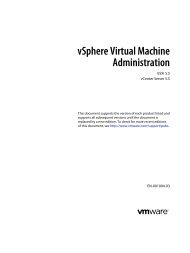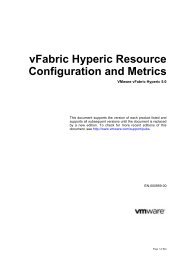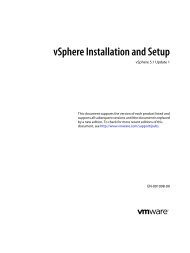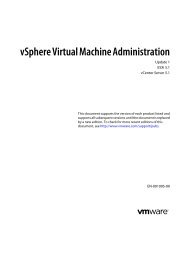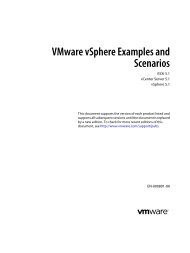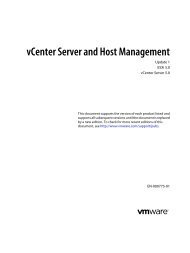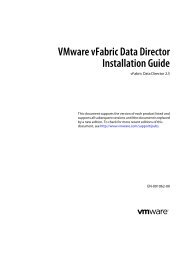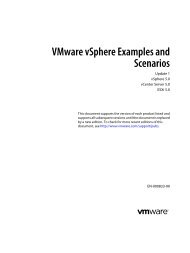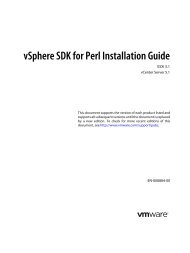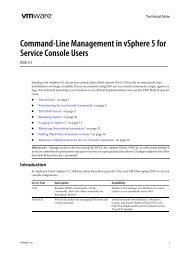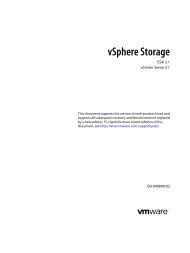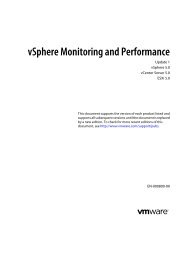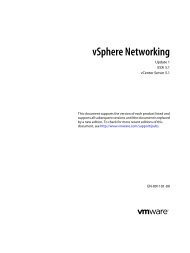vSphere SDK for Perl Programming Guide - Documentation - VMware
vSphere SDK for Perl Programming Guide - Documentation - VMware
vSphere SDK for Perl Programming Guide - Documentation - VMware
You also want an ePaper? Increase the reach of your titles
YUMPU automatically turns print PDFs into web optimized ePapers that Google loves.
Example<br />
$client->register_xml_ns((wsen => 'http://www.dmtf.org/wsen'));<br />
Appendix A Web Services <strong>for</strong> Management <strong>Perl</strong> Library<br />
Declares a prefix wsen with the URL http://www.dmtf.org/wsen in the global XML namespace.<br />
register_class_ns<br />
Registers extra ResourceURIs that the WS‐Management server might require. By default, the constructor<br />
provides a set of ResourceURIs only <strong>for</strong> classes in the CIM schema. Classes with other schema names, such as<br />
<strong>VMware</strong>_* classes, require a different ResourceURI when enumerated using the <strong>vSphere</strong> <strong>SDK</strong> <strong>for</strong> <strong>Perl</strong>.<br />
You can find the ResourceURIs corresponding to other supported schemas in the OpenWSMan configuration<br />
file, which is located in the serverʹs file system at /etc/openwsman/openwsman.conf. The ResourceURIs are<br />
listed in the value of the vendor_namespaces configuration parameter.<br />
Arguments<br />
A hash. Keys are the prefixes, values are the relative URLs as values.<br />
Example<br />
$client->register_class_ns((OMC => 'http://schema.omc-project.org/wbem/wscim/1/cim-schema/2',<br />
<strong>VMware</strong> => 'http://schemas.vmware.com/wbem/wscim/1/cim-schema/2'));<br />
Registers the ResourceURIs needed to enumerate classes in the OMC and <strong>VMware</strong> schemas.<br />
Identify<br />
Per<strong>for</strong>ms the wsmid:Identify operation, which causes the WS‐Management server to identify itself. Helps<br />
you determine whether the server is up and running.<br />
Arguments<br />
No arguments.<br />
Returns<br />
Returns a SOAP::SOM object, which you can use to parse the results or do error correction.<br />
Enumerate<br />
Filters results depending on the arguments you pass in. Several arguments per<strong>for</strong>m generic operations that<br />
are implemented in another class, as described in “Generic CIM Operations with WSMan::GenericOps” on<br />
page 57. Other arguments implement enumeration <strong>for</strong> non‐standard‐compliant servers. This document<br />
discusses the most common arguments. Look at the <strong>Perl</strong> code <strong>for</strong> in<strong>for</strong>mation on other arguments.<br />
Arguments<br />
Accepts the following arguments:<br />
Argument Description<br />
class_name Specifies the class that you want to enumerate. This argument is passed as a string.<br />
namespace Default CIM namespace. Default is root/cimv2.<br />
If the namespace is not root/cimv2, you must pass in the namespace of the class in this<br />
argument.<br />
enummode (optional) Specifies an enumeration mode such as EnumerateEPR or EnumerateEPRandObject.<br />
This argument is passed as a string.<br />
polymorphism (optional) Specifies polymorphism modes, passed in as a string. For example<br />
IncludeSubClassProperties, ExcludeSubClassProperties, and None.<br />
<strong>VMware</strong>, Inc. 55



